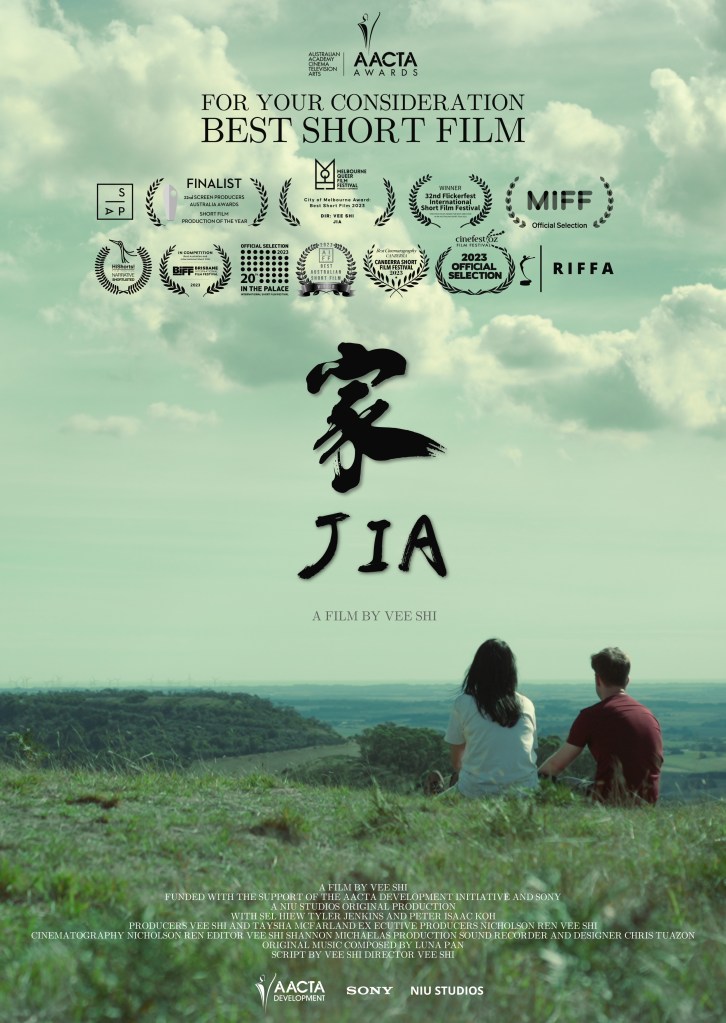A conservative Chinese mother (Ming) meets the Caucasian boyfriend of her closeted, deceased son (Yao). Together they take a road trip through rural Victoria, travelling along the same route Yao took with Eric before dying in a car accident. Despite their differences, Ming and Eric find a common language through their shared grief and love. Jia is a meditation on memory and how we remember those we mourn. The psychogeography of their shared journey navigates what Director Vee Shi calls, ‘the universal truths in our experiences that bind us together’.
Explaining the title of the film and his inspiration, Shi says, ‘Jia (家) means home in Chinese. The film is inspired by my relationship with my mother. Since my arrival in Australia, the generational and cultural barriers between us have grown more evident. However, despite these challenges, she always feels like home to me. I wanted to capture what that love feels like in a film.’
Shi has chosen not to tell his mother about the film, as he has not come out to her. He says, ‘It’s a letter to my mother. It encapsulates my deepest love for her, but also my most terrifying fear and a secret that I am unable to tell her in words… I came to Australia when I was 18 and, over the years, my mum and I have fewer and fewer words to communicate as my Chinese deteriorates. But our love deepens despite the language barriers. So I challenged myself to tell a story with almost no dialogue and focused on things that we all share across cultures.’
Read: Flickerfest prepares to dazzle Bondi with another year of stellar shorts
Jia begins with a majestic shot of sand dunes gently rippling in the wind. Sand is a recurring motif and, as Shi explains, ‘The ritual of spreading sand from one’s hometown symbolises connecting your current home to a place of familiarity or origin, offering comfort. It also mirrors the act of spreading ashes back into nature, completing a life and death cycle’. The old Chinese tradition of “jia xiang tu” (家乡土), which translates to mean “hometown soil”, is practised by people when travelling, allowing them to take a piece of their home with them when feeling homesick.
Inspired by the cinematic language of Jia Zhangke’s Still Life (2006) and Chloé Zhao’s Nomadland (2020), Jia’s natural lighting and sweeping landscapes come from a tradition of naturalist filmmaking. Shi says, ‘My intention was to portray the story in its most raw and unpolished form. So, no artificial lighting, no makeup for actors, subtle camera movements, minimal editing and (almost) no music to dictate audience emotions. These elements allowed each moment to breathe, letting the audience find resonance based on their own experiences.’
Shi’s friend, Luna Pan, composed a piano accompaniment that he felt ‘really captured the film’s essence’, as well as a ‘sense of isolation’. Shi proudly admits, ‘Filmmaking is such a collaborative process and the final film was more emotionally impactful than I had envisioned because of the generosity and talents of the cast and crew.’
Joining him was cinematographer and producer Nicholson Ren. Together they filmed over seven days and across 842 kilometres. Ren says, ‘The cinematography of Jia was heavily influenced by natural and practical lighting.’ The film’s expansive landscapes contrast with the intimate scenes between Ming and Eric in the car, which Ren says ‘serve as a comforting reminder that while our grief seems to encapsulate our world at that moment, we are all but just a tiny part of something bigger’.
Aiming to create a film that felt both ‘deliberate and authentic’, Shi says, ‘We always allowed the actors to improvise during the first two takes. We then shaped the scenes based on both our technical rehearsals and the actors’ initial reactions to the script.’
Ren adds, ‘Lighting design would be governed by what was available. We made a conscious choice to not spend any of the budget on lighting equipment and, to take it a step further, we did not bring any lighting equipment at all, not even a reflector.’ This intentional decision meant that ‘everything available to us was natural or whatever was already at the location’.
‘Our philosophy for the shoot was very simply everything was to be done with available lighting and without manipulation. To make sure we wouldn’t be tempted to cheat, we didn’t bring any lights nor did we plan for any back-up,’ says Ren.

Sel Hiew, who plays Ming, came from a career in finance, but after her job was made redundant, she wanted to ‘take a step back from the corporate rat race to focus on home and family’. During this time, she started working as an extra and enjoyed working on film sets. Following this, she began taking acting courses and signing up for auditions, which eventually led to her to pursue acting full-time.
Upon being introduced to Jia, she says, ‘I really connected to the concept and script. I thought it was such a beautiful story – full of many different emotions and meaning. Also, when Vee shared with me that he hadn’t come out to his mum yet, I formed the belief that he wanted the film to come out to his mum. It’s very Chinese to tell someone something without having to say it directly. I haven’t spoken to Vee about this, so this is all my speculation – I’m being very Chinese in not speaking about it with him directly.’
Hiew says, ‘I connected to the grief that Ming felt as I lost my grandmother, who was more like a mother to me. I lost her more than three decades ago when she was 97 years old. It was just her time to go. There are no regrets and, yet, I still have a hole in my heart, probably because my love for her goes on… Sometimes the more love there is, the more pain there is.’
She continues, ‘As a mother, I know what it means to love a child. Before having children, I had no idea I could feel this way. I’m not able to express it in words and I’ve found only other parents understand it. It was this that made me feel Ming had to hum a lullaby to Yao after bringing him candy and sand from the home village, to help him find rest and peace.
‘I felt Ming was grieving the total loss of a family, not just the loss of a son. When I speak Chinese, I use the word “jia 家” for family as well. So, in accepting Yao’s relationship, Ming also found family again. When I’ve lost family members, it is the embrace of family and friends that gave me comfort and helped me see a future. I was able to smile amid tears and grief in those moments.’
Read: Interview with the creatives behind Sweet Juices
The majority of the funding for Jia was won through the AACTA (Australian Academy of Cinema and Television Arts) Pitch Focus competition. After advancing through three rounds, the filmmakers were able to secure $15,000 to make the film, in collaboration with Sony, which provided the technical equipment. Raised in a village in China, Shi says, ‘The idea of pursuing a career in the creative industry never crossed my mind until I moved to Melbourne at age 18.’ He initially studied interior and product design, but then changed to screenwriting and is currently working as a Development Executive with Big and Little Films.
Jia was selected at part of the 2023 MIFF Accelerator Lab, and has gone on to win multiple awards, most recently including the Melbourne Queer Film Festival’s City of Melbourne Award for Best Australian Short Film, Australia Independent Film Festival’s Best Australian Short Film and Flickerfest’s Winner of Best Direction in an Australian Short Film. It has also been nominated for Best Short Film Production of the Year at the Screen Producers Australian Awards and Best Short Film at the 2024 AACTA Awards, which AACTA members can watch and vote for here; voting closes 9 January 2024.
Jia is available on SBS Demand.
This article is published under the Amplify Collective, an initiative supported by The Walkley Foundation and made possible through funding from the Meta Australian News Fund.





